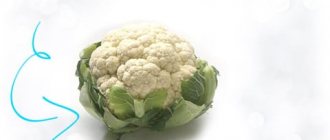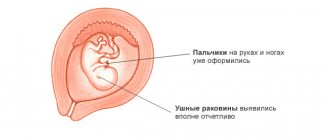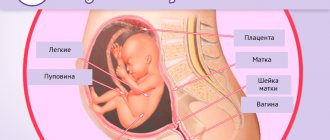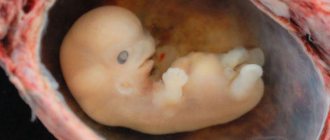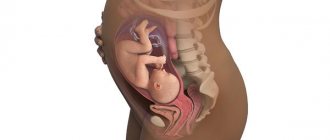The fruit and its development
All the baby’s organs are already formed, some are at the stage of completion of formation.
The child grows, gains weight and fat is already deposited, which is responsible for preserving his body heat and maintaining body temperature. The fat that is now accumulating in the baby is called adipose tissue. This tissue is also involved in metabolism and is a source of energy. This week of pregnancy is a period of active growth for the baby.
As for the size of the fetus, by the end of the week the child will grow to 17 cm and weigh up to 140 grams.
The baby behaves even more actively, moves and tumbles, actively moving his body. And there is a chance that you will feel his movements for the first time, if you have not felt the baby moving before.
Your baby leads an active lifestyle, his movements become more conscious and coordinated. The baby improves swallowing and sucking reflexes. He constantly sucks his thumb and swallows liquid. His facial expressions are developed, he smiles and even yawns when he wants to sleep.
The genitals are in the final stages of formation. In girls, the uterus and vagina are formed. Boys develop a penis and prostate gland.
During this period, the child's hearing is well developed. Now you can start accustoming your child to music and talking to him. Not only for you, but also for the future dad. After all, the voices that he hears now, he will recognize when he is born, they will become family to him. Your baby also reacts to light. If you bring a lamp to your stomach, the baby will turn towards the light at this time, although his eyes are still closed, he sees the light through his eyelids.
Fetal movements
Pregnancy of 17 weeks is characterized by the appearance of sensations of fetal movement. This period is considered quite arbitrary, since thin women can feel these movements a little earlier. But at earlier stages they can easily be confused with intestinal function. In the dark, the child may become quiet and become more active during the day.
Its movements may feel like light stroking, fluttering or pressing. This phenomenon is purely individual in nature and does not have specific norms.
Changes and sensations
As the child grows, the uterus enlarges. It is located in the abdominal cavity and is already below two centimeters from the navel. As it grows, it pushes away the organs that interfere with it. Because of this, some changes occur in the female body and entail unpleasant sensations.
This is how the fetus is located in the tummy
- The gastrointestinal tract is primarily affected. The uterus constantly puts pressure on the intestines, which can result in heartburn and improper bowel function. During this period, you need to adjust your diet.
- There is a heavy load on the heart. Now the blood volume in your body has increased by 20%. The heart diligently pumps blood to deliver the necessary substances and oxygen to your baby in a timely manner. Due to increased blood circulation, you may experience increased sweating and vaginal discharge. Don't worry, this is a normal process, just improve your hygiene. Please note that normal discharge during pregnancy should be white with a sour odor. If you have other discharge, be sure to consult a doctor, as any infection is dangerous to the child’s health.
- Now your body is completely attuned to pregnancy, you feel how your view of the world around you is changing, you are a happy expectant mother. Because you're so caught up in your pregnancy, you may be distracted and have trouble concentrating right now.
- The breasts become less sensitive. Small white pimples may appear near the nipples, and veins may be clearly visible. These are all normal phenomena during pregnancy. Pigmentation on the body, a brown stripe on the stomach, and darkening of the nipples also appear.
- At the 17th week of pregnancy, many women begin to experience late toxicosis.
Late toxicosis is not vomiting, nausea and bad mood, but the appearance of swelling of the limbs. The first signs of swelling that you will notice is that your shoes become too small as your feet become swollen. Swelling can also occur on the hands and even on the face. The main factor that you need to pay attention to in case of swelling is weight gain more than normal.
Fifth month on the way to childbirth or 17 weeks of pregnancy
Hello, dear readers! I'm glad you visited my blog, I will try not to disappoint you. Today I will tell you about various interesting things, for example: what the first movement of a baby in the stomach looks like, is intrauterine communication with a child possible, what amniocentesis is, how to recognize the signs of late toxicosis, why uterine tone is dangerous, why pregnant women should not sleep on their backs. Something in our conversation will make you seriously wary and even frightened. Read the article to the end, and you will learn a lot more interesting things about what happens at 17 weeks of pregnancy.
The 17th obstetric week is the fifth month of pregnancy. The second trimester has already begun. The child is growing more and more, in size it now resembles an average onion weighing from 120 to 180 g and with a diameter from 12 to 18 cm.
There is still enough space in the mother’s belly to move actively, so the baby is comfortable. He studies himself and the space around him, feels parts of his face, the umbilical cord, sucks his thumb, and somersaults like an acrobat.
The main event of this month for the little man is the developed ability to hear. Now a whole stream of sounds falls on him. This is not only the rumbling of the stomach or the beating of the mother’s heart, but also various noises from the outside.
Already now, dad and mom can and should communicate with the baby so that he remembers his native voices and gets used to them. I myself watched as my pregnant friend talked to her son in her belly, read him children’s stories, and sang songs. And although this may seem funny and even stupid to many, I believe that both mother and child need such things. I can recommend one interesting book about how to develop children before birth.
What else remarkable happens in a child’s development during this period?
- Light hair growth appears on the skin - lanugo. This fuzz may remain for some time after birth, but usually children are born without it.
- The baby's body is covered with a whitish protective lubricant; it can be seen on the newborn in the first minutes of his life.
- The first fat layer appears. In its place, a permanent layer of fat will then appear, which a person needs to regulate heat exchange.
- At week 17, the baby’s immune system starts working. The production of protective antibodies begins.
- The heart is already fully developed, it works hard, making up to 160 beats per minute. When examining a pregnant woman, from now on the doctor will listen to the baby’s heartbeat through a special tube at each appointment. It is applied with one side to the ear, the other directly to the stomach.
- The fifth month is the time of formation of the rudiments of permanent teeth in the baby’s mouth.
- Tiny girls who have not yet been born are already preparing for future motherhood: they are developing one of the main reproductive organs - the uterus.
Imagine that you are already halfway to your desired goal. How will you feel? If everything goes well, then the expectation of the cherished result inspires you. The anticipation of future motherhood is difficult to compare with anything. This must be experienced. The fifth month is approaching the middle of pregnancy.
At this time, the woman is full of strength, energy, she already fully feels her position, since her tummy has already grown significantly. However, rounded shapes do not cause discomfort or hinder the movements of the expectant mother, but rather add smoothness and regularity to her. The mood is peaceful, thoughts of the baby permeate everything around.
At this stage, a woman can already experience one of the most exciting moments - the first movement of her child. He started moving a long time ago, but mommy will only be able to feel it now, when the baby has grown up.
All women describe their sensations differently: some feel like a small fish is tickling with its fin, others talk about the fluttering of a moth, some compare the pushing of a baby to the bubbling of accumulated gases, sometimes it feels like a crawling caterpillar or the touch of a kitten’s paw.
A friend told me that she felt like someone was rolling a small ball over her stomach. Usually, first-time mothers feel their baby after the 20th week. Particularly sensitive or experienced mothers hear the movements of the baby starting from 16-17 weeks.
Both parents are looking forward to the next moment. At a routine ultrasound, you can already find out who you will have: a son or a daughter. True, everything will depend on whether the baby wants to turn the “right” side to the device. One of my friends had this story. During the ultrasound they told her all the time that it would be a boy, but the birth was a girl. It also happens the other way around. If you truly love and are looking forward to your future baby, its gender should not be of significant importance to you.
The time has come to tell you about this mysterious word. Amniocentesis is the process of taking samples of amniotic fluid for later analysis. This is the amniotic fluid in which the baby remains inside the abdomen until it is born. To be honest, this procedure personally scares me a little. I wouldn't agree to it. But the decision is yours to make.
To take water, you need to puncture the amniotic sac. According to the stories of survivors, the whole procedure is quite painful. This analysis is usually done between 16 and 18 weeks. This diagnostic method allows you to determine the presence of genetic abnormalities that cause serious illnesses in a child.
It is usually carried out without harm to the child and mother, but there are still certain risks. In addition, you should be prepared to hear any news (even bad) after receiving the test results.
- Cardiopalmus. This is due to the work of the placenta to supply the baby with nutrients, your heart helps it cope better.
- Blood circulation increases, the load on small vessels increases, frequent nosebleeds occur, and bleeding gums bother you.
- Vaginal discharge becomes more abundant and sweating increases.
- During this period, thrush may worsen.
- Shortness of breath develops.
- I often want to go to the toilet “in a small way.”
- Colostrum may be released from the breast.
- Digestive problems: heartburn, constipation, flatulence.
- The appearance of age spots, stretch marks and acne on the skin.
- Stitching pains may be bothersome. I wrote about why they arise here. They occur on the sides of the abdomen or below. This is normal: stretching of the skin and ligaments occurs due to the growth of the uterus.
In the fifth month, a pregnant woman can face serious troubles. You are interested? Then let's move on.
Toxicosis of the second half of pregnancy (or gestosis) is more dangerous and manifests itself differently (in contrast to the completely harmless early toxicosis). If this phenomenon is left unattended, there may be a threat to the life of both the child and the mother. Look at what signs indicate toxicosis:
- Swelling on the legs and face,
- Increased pressure,
- The appearance of protein in the urine,
- Impaired kidney function (the amount of urine decreases),
- Large weight gain
- Headache,
- Poor eyesight,
- Nausea or vomiting
- Cramps and fainting.
Women describe it this way: the abdominal muscles suddenly tense, it hardens, becomes stone. This state can last for several minutes. If the uterus becomes toned often and for a long time, it becomes dangerous for the child. In the early stages, tone will provoke a miscarriage.
At a later date (for example, 17 weeks), the result of such “exercises” may be premature birth. Contractions of the uterus squeeze the placenta, oxygen supply is poor, and the baby develops hypoxia (oxygen starvation). Hypoxia is very bad, the baby will not grow well, its development will stop or stop altogether.
The reasons for this condition can be different: severe stress, excessive physical activity, toxicosis, severe stretching of the uterus, infectious diseases, hormonal imbalances, taking certain medications and even the accumulation of gases in the intestines.
Dear mothers, if you are about to give birth, do not be bothered by periodic uterine contractions. This is how she trains and prepares for future births. This is absolutely normal.
This is one of the most terrible diagnoses that an expectant mother can hear. I can hardly even talk about it. But life is life, everything happens in it.
Most often this happens in the first trimester. But this is also possible at 17 weeks.
During a frozen pregnancy, the fetus stops developing and dies right in the mother’s stomach. I don’t know about you, but for me personally, the horror of the situation is that a happy mother does not immediately notice the death of her baby. She continues to love him and wait, refuses to believe in obvious facts.
What are the symptoms of fading pregnancy?
- Early toxicosis suddenly disappears.
- The breasts lose their sensitivity and decrease in size.
- Pulls in the lower abdomen.
- There is a discharge with blood from the vagina.
- Increased body temperature, chills, fever, severe abdominal pain, weakness.
- In the later stages, you may notice a lack of pushing by the baby.
- The uterus or abdomen does not correspond to the gestational age.
- Absence of the baby's heartbeat during a routine examination of the patient.
A pregnancy that is not developing can be determined using a pregnancy test. It will show a negative result.
The most reliable way is an ultrasound. To be more convincing, a repeat study is prescribed after a certain time.
A blood test for hCG is also performed.
Treatment in such a situation can only be termination of pregnancy.
If this is not done on time, the woman risks never becoming a mother again. And bleeding that develops can be life-threatening.
At the end of my article, I would like to give some more advice for those who are now in their fifth month.
- You only need to sleep on your side. If you lie on your back, the heavy uterus compresses the vena cava, blood does not flow to the baby, and with it oxygen and nutrients.
- Curb your appetite. Monitor the quality of food. Danger: excess weight, constipation, heartburn. Eat often and in small portions.
- By taking walks, you will kill two birds with one stone: you will give physical exercise to your muscles and saturate your child with oxygen.
- Wear loose, breathable clothing and no heels.
- Don't be afraid to have sex if your pregnancy is progressing normally.
- Use stretch mark cream.
- Go swimming.
- Take vitamins and minerals, especially vitamin D and calcium.
That's all I wanted to tell you today. Thank you for your attention, visit my blog more often, share the link with your friends, subscribe to updates. See you again, friends! Be healthy!
How should you eat?
Now your musculoskeletal system activity begins to decrease. You begin to move and walk less, while the uterus also puts pressure on the gastrointestinal tract, thereby causing your body to malfunction, causing heartburn and constipation.
First of all, start eating more often, but in small portions. You need to eat about five times a day. After eating, introduce a 30-minute walk into your daily routine. When walking, the gastrointestinal tract works better. That is, by walking you promote good absorption of nutrients. Also at this moment you help the heart and circulatory system by saturating your body with oxygen. And your body produces vitamin D with the help of sunlight.
In order to prevent the symptoms of heartburn, change your diet, adding a daily intake of soups, cereals and jelly. These foods will create a lining in the stomach, thereby preventing the symptoms of heartburn. Remove from your diet foods that help the stomach produce gastric juice, such as sour berries, smoked and fatty foods, coffee, tea.
The child begins to form red cells in the blood, for this he needs iron. To do this, you need to include iron-rich foods in your diet. Try to fully provide your body with the required amount of iron.
What is heartburn?
Heartburn is a burning sensation in the pit of the stomach and a sensation of pain in the upper chest, which is caused by the reflux of stomach contents back into the esophagus some time after eating.
The fact is that gastric juice is concentrated hydrochloric acid, which is mixed with pepsin, bile acids and enzymes produced by the pancreas. This aggressive environment, affecting the nerve endings of the walls of the esophagus, causes discomfort.
Heartburn can appear at 17, 38, or 40 weeks, and even just before childbirth, but in any case, you must inform your doctor about this. There are some signs regarding the occurrence of this condition in pregnant women that do not have any scientific basis, while it is caused by specific factors.
Weight control
During the second trimester, you have a good appetite, which can lead to overeating and, as a result, a sharp weight gain, which should not be allowed. Watch your weight. If you constantly feel hungry, split up your diet, that is, the amount of food remains the same, but the number of meals is larger. Eat less and more often.
During the 17th week you should gain about 500 grams. Watch your own weight. It is easier to control your weight by doing light sports: brisk walking or swimming. Exercising will help you control your weight. Exercise is also useful because it prepares your body for future childbirth.
Remember that on average a woman gains 11-16 kg during pregnancy. That is, now you should gain 3-5 kg from the weight you had before pregnancy.
Changes in the body
A growing pregnancy constantly adds weight. By week 17, it should increase by 3-6 kg. Depending on the woman’s body structure and the rate of weight gain, the belly can be clearly visible or almost invisible.
Attention: on average, a pregnant woman's weekly weight gain should be 250-300 grams.
The placenta continues to grow with the fetus, but is already fully formed, its weight approaches 0.5 kg. The network of blood vessels fully satisfies the child’s needs - it supplies oxygen and nutrients, and removes metabolic products.
To meet the needs of the fetus, the pregnant woman's heart rate increased by almost 40%. The uterus is located 3.5-5 cm below the navel. It has almost stopped growing horizontally and is now growing upward. Its size begins to have a noticeable effect on neighboring organs.
At week 17, heartburn after eating, bloating, and flatulence often appear. This suggests that you need to switch to fractional meals.
A network of blood vessels becomes noticeable on the chest, its size increases, and points of sebaceous glands are noticeable on the nipples. Colostrum may be released.
Facial features change - they become blurred due to swelling of the lips and nose. A blush often appears on the cheeks. The number of age spots increases.

Recommendations for the expectant mother:
- First of all, control your weight and watch your diet. The diet should be enriched with vitamins and iron.
- Every woman has her own tummy. It all depends on the constitution of the body, but it’s time to start wearing loose clothes and forget about high-heeled shoes.
- During this week, you can have sex, but you just need to take care of comfortable positions for the pregnant woman.
- Since your heart is now working as hard as it can, it is not recommended to take a hot bath or visit the bathhouse or sauna.
- Your kidneys work in active mode, they filter not only the waste products of your body, but also that of the baby. Because of this, watch your urination, as stagnation of fluid in the body may occur. Control this process, go to the toilet more often. Perhaps you need to drink lingonberry broth during this period.
- Your baby is very sensitive to radiation, so try to use household appliances less. Try to sit at the computer less, use the microwave oven, and use the cell phone.
- Eliminate all possible stressful situations during pregnancy. Stress affects fetal development. Research has shown that if a woman experiences constant stress during the second trimester, this can increase corticotropin-releasing hormone in her body, which causes preterm labor. If for some reason you cannot avoid stressful situations, you need to learn to relax so that your body can rest. Start doing yoga or meditation to help you relax and increase your resistance to stress.
- Be wary of medications, both those sold with a prescription and especially those sold without a prescription. What was harmless before pregnancy can provoke fetal fading now. After all, even Aspirin can cause bleeding. Remember that self-medication is not an option during pregnancy. Consult your doctor before starting any medications.
Changes in the placenta
The thickness of the placenta at 17 weeks of pregnancy is 1.7 cm. By this time, it is already fully performing its functions, the main of which are:
- Respiratory. There is an uninterrupted flow of oxygen and removal of carbon dioxide through the baby's place.
- Protective. The placenta prevents the impact of negative mechanical and chemical factors on the fetus, but it does not protect against the penetration of nicotine, psychotropic drugs, antibiotics and alcohol.
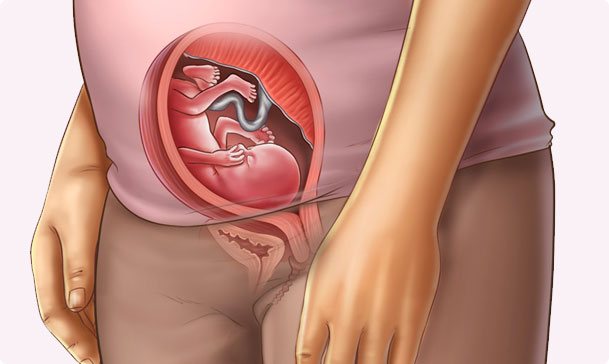
- Trophic. Provides a constant supply of nutrients, vitamins and minerals necessary for fetal development.
- Immune. The placenta prevents rejection of the fetus when Rh conflict occurs.
- Hormonal. It not only carries out the transfer of maternal hormones to the fetal body, but also produces estrogen, progesterone, prolactin, cortisol and some other compounds.
The gradual thickening of the placenta is a normal physiological process, since as the embryo grows, it requires more nutrients.
Its slow development leads to fetal hypoxia, when the child experiences a lack of oxygen and also suffers from an insufficient supply of substances necessary for development. As a result, the newborn may have too little weight, weak body resistance to external factors, and may also be born prematurely.
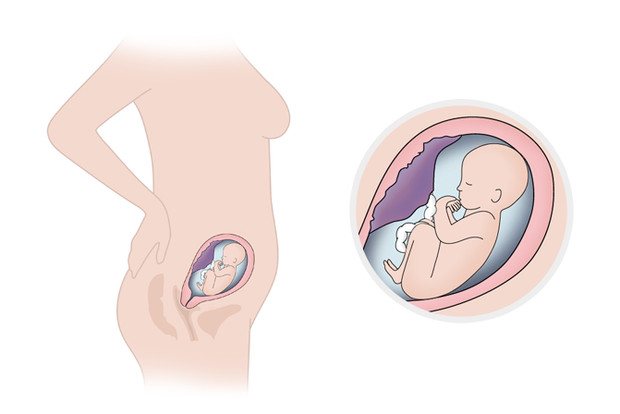
During times of stress, great emotional stress, lack of sleep, infectious and viral diseases of the mother, a sharp thickening and maturation of the placenta occurs. This can cause premature labor.
Question answer
Q: 17th week of pregnancy - what month is it? A: The seventeenth obstetric week of pregnancy is the 15th week from conception or 3 months and 3 weeks of pregnancy.
Q: Please give me some advice, I am 17 weeks pregnant, and my husband has a severe cold, high fever and cough. How to avoid getting the flu from him? A: To prevent influenza and acute respiratory viral infections, upon contact with a patient or at the first signs of a cold during pregnancy, it is recommended to instill/inject influenzaferon into the nose (release forms: drops or spray).
When is an ultrasound required?
In the second trimester of pregnancy, routine ultrasound is performed between 18 and 21 weeks. This study may be performed at week 17 for the following indications:
- Detection of isthmic-cervical insufficiency, which leads to miscarriage up to 22 weeks.
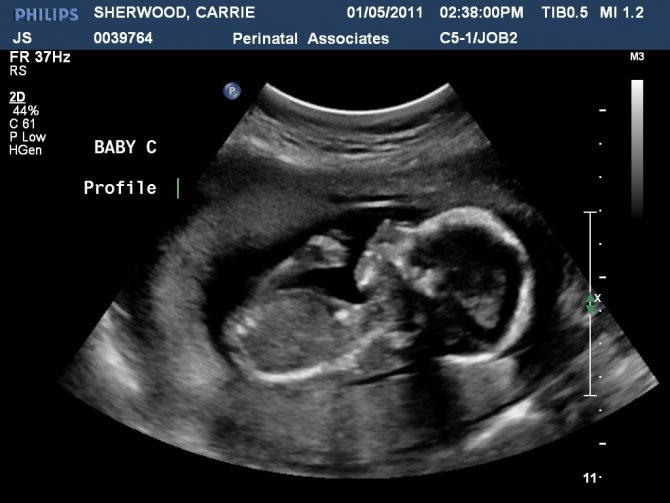
With this disease, the muscles of the cervix relax long before childbirth, while the cervix itself becomes shorter and begins to open. As a result of this, prolapse of the membranes occurs, infection of the amniotic membranes, their premature rupture and the onset of labor. A timely diagnosis allows you to take the necessary measures, maintain the pregnancy and save the fetus. - Determining the sex of the child. This examination is carried out if it is necessary to exclude congenital pathologies that are transmitted through the paternal line.
- In case of threat of miscarriage.
At 17 weeks, an ultrasound scan can clearly distinguish the arms and legs, genital organs of the fetus, facial expressions and possible developmental anomalies. The doctor takes measurements of certain parts of the body, determines the symmetry of the limbs, mobility and rhythm of the heartbeat.
Particular attention is paid to the umbilical cord. At this stage it should be completely formed. Three large blood vessels should be clearly visible in it.
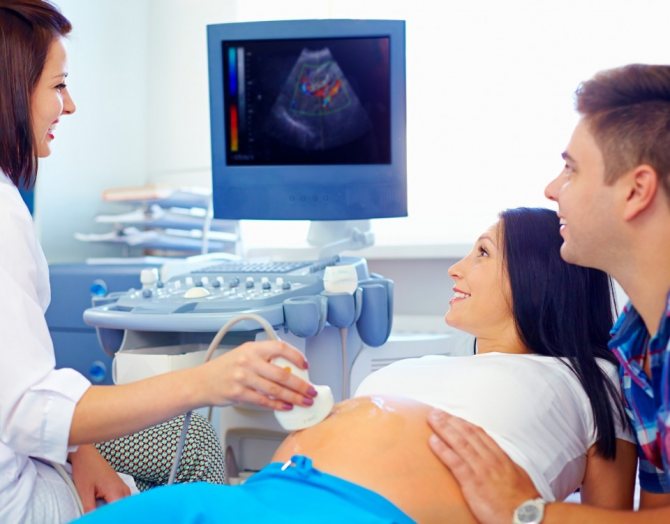
Ultrasound photo of the child
By the 17th week of pregnancy, the baby has become just like the person who lives in your tummy in his own little world, where for him you are already the most beloved and most important in the world. By the way, some studies have shown that when the baby is still in the womb, he dreams. The proof of this is that his eyes move quickly, like those of an adult, when he dreams. So maybe now your baby, when he sleeps, has bright and colorful dreams.
What to watch out for
If a pregnant woman often begins to utter the same phrase: “I’m 17 weeks pregnant, I don’t feel any movement,” then this circumstance should not leave her family indifferent. After all, during this period, both mother and child face various dangers. For example, if a mother has not given up bad habits, such as drinking alcohol and smoking, then there is a high risk of giving birth to a baby with various pathologies, and in some cases, such irresponsibility can lead to placental abruption and premature birth. Negative factors that can cause a deterioration in the condition of the pregnant woman and fetus and even its death include the use of medications that were not prescribed by a doctor. And of course, mommy needs to be very careful in public transport or on the street in winter, since any fall or blow to the stomach can have the most dire consequences. Pregnant women who drive a car should be especially careful. If you can’t completely give up driving on your own, then at least you shouldn’t drive without a seatbelt. In this case, the belt should pass under the stomach.

